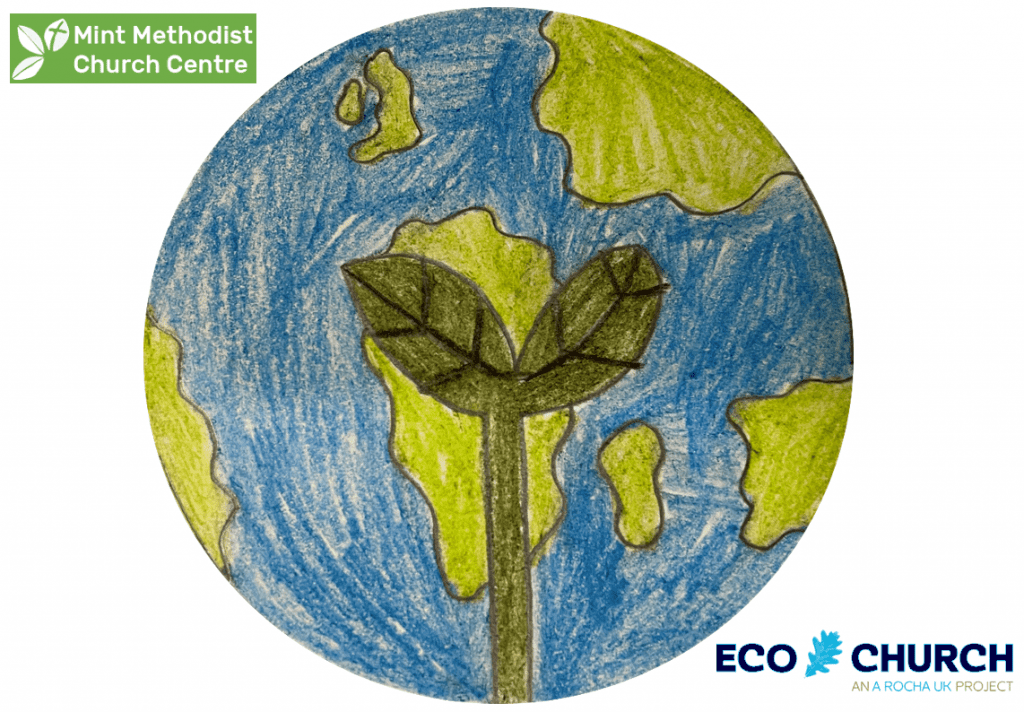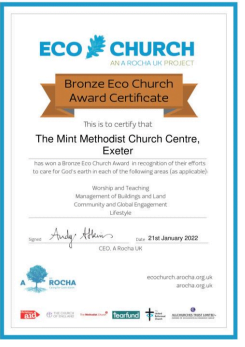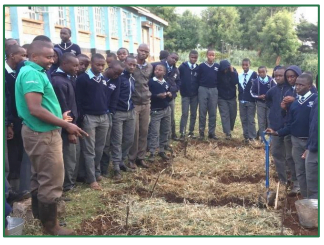Mint achieves Bronze Award


Recently the Mint achieved the Bronze Award under A Rocha UK’s Eco Church scheme, designed for churches who want to demonstrate that the gospel is good news for God’s earth. We are ensuring that the theme of care for creation is included within our worship and teaching, strengthening the green credentials of our building and activities, working in local and global partnerships with others committed to environmental concerns, and looking at our lifestyle choices. Thank you to all those individuals and groups who have been involved in achieving this.
We look forward to journeying further in the way we care for the world, through working towards our Silver Award. If you are interested to find out more
or to join the Mint Eco Church group, please speak to Sue Cordery or Stephen Mosedale.
One prayer at a time


The Eco Church scheme encourages churches to pray for a specific environment project overseas, and the first project we’re supporting in this way is Miti Alliance in Kenya (www.miti.co.ke). Miti means trees in Kiswahili, and the Miti Alliance is a social enterprise promoting community tree planting, aiming to “Green Kenya one tree at a time.” A central part of Miti’s work is the schools programme. Primary and secondary school students are enabled to learn about biodiversity, sustainability, climate change, and the importance of trees. They are taught how to set up and run tree nurseries, and to plant and care for trees. Each student adopts one of the trees they plant, watering and caring for it as it grows. Miti Alliance was founded in 2018 by Michael Waiyaki, a member of Lavington United Church. He says “We have a great opportunity in this generation, to look back and see the harm done to the beautiful world, and to decide not to sit back, but to do something for the next generation after Miti Alliance has an upcoming weekend activity they’d like us to pray for. It will be with 70 kids and teachers of two schools, aiming to empower the next generation of environmentalists to understand the importance of conservation and the role it plays for all of us in the world. It will include a clean-up at their forest. Roger Day
Making Eco-Friendly Choices Carbon Offsets: Greenwashing or Important Tool towards Net Zero?
Stephen Haddad wanted to find out for his trip to South Africa.
In the July 2021 issue of Forward, I reviewed how to reduce the environmental impact, particularly carbon emissions, of travelling to and from your holiday destination. Where possible one should choose low or zero emissions options, such as travelling by electric car or train rather than flying. For some routes there are no sensible alternatives, so one must fly. There are still ways to minimise one’s emissions, by flying economy or choosing an airline with newer, more fuel-efficient aircraft. Ultimately though, for some journeys carbon emissions are inevitable. So what can be done about these hard-to-reduce emissions? My recent trip to South Africa to visit family is an example of a journey for which there was limited scope to reduce emissions, other than simply not travelling (which had been enforced on me by the pandemic) or travelling economy (always enforced on me by economics!). In working towards personal net-zero, the only option when I visit my family is to offset my portion of the carbon that is emitted by my flight. How then do carbon offsets work? The concept is simple. For each 1kg of carbon that you have caused to be emitted, you either pay someone to emit 1kg less than they otherwise would have done; or you pay someone to do something that will absorb 1kg carbon from the atmosphere. An example of the former is subsidising the purchase of LED based electric lighting or efficient cooking stoves; and a common example of the latter is supporting tree planting schemes. You calculate how much carbon your flight (or other activity) has produced, and purchase offsets for those emissions, so that on paper your activity has net-zero emissions.

Unfortunately, there are problems with calculating the true emissions you want to offset, as well as with determining how much carbon is really reduced or absorbed because of the offsets that you purchased. For the emissions, we should really be considering the full supply chain, rather than just the jet fuel. And we should also take account of the fact that the climate
impact of 1kg of carbon depends on how and at what altitude it is emitted. The larger problem though, is in determining how much carbon is really offset. Some schemes calculate how much they will offset once implemented, but for assorted reasons the 6 scheme may not be implemented as planned and so actually offsets less carbon than the offsets that are sold. There is also a lack of knowledge about some carbon absorbing processes and how the absorption should be measured, leading to uncertainty about the total carbon absorbed by offsets. Some offset schemes may
also have a negative impact on the local area in which they are implemented. So schemes need to be monitored and audited to ensure they deliver what they promise. With all this in mind I went looking for somewhere reputable to purchase offsets so that I knew the money I spent would actually be reducing the carbon put into the atmosphere. I spent a long time searching, because it was not clear how I should make such a decision or judge whether the offsets are genuine. Prices per kg of CO2 and recommended offsets varied between offerings for no clearly specified reasons.
Eventually I followed the Which advice. Which recommends a 2 step process: use the International Civil Aviation Organization (ICAO) emissions calculator for your flight to determine your CO2 emissions, then use the AtmosFair website to purchase offsets from well managed and monitored schemes. So, are carbon offsets legitimate and worth it, or are they just greenwashing, making those who emit a lot of carbon for leisure travel look good and feel better? They’re imperfect tools, but they’re better than doing nothing. If you need to fly, to be environmentally responsible offsets are a must, but it is important to not treat offsets as a get-out-of-jail-free card, a sort of modern version of medieval indulgences to buy forgiveness for environmental sins. We must still be aiming for zero carbon emissions in the first place. Fortunately, technological solutions such as hydrogen or electric planes to enable zero-emissions flights, are being urgently developed, but they are still a long way off. In the meanwhile, reduce flights where possible and offset the emissions where you cannot.
Further reading Which article on Offsets:
https://www.which.co.uk/reviews/airlines/article/airlines/carbon-offsetting-how-toreduce-the-impact-of-flying-abuH44x4FeWn
ICAO Emissions Calculator: https://www.icao.int/environmentalprotection/Carbonoffset/Pages/default.aspx
AtmosFair Offsets purchase service: https://www.atmosfair.de/en/
Guardian guide to Carbon offsets :
https://www.theguardian.com/environment/2011/sep/16/carbon-offset-projectscarbon-emissions
NyTimes article on Hydrogen planes
https://www.nytimes.com/2021/11/15/business/airplanes-hydrogen-fueltravel.html
